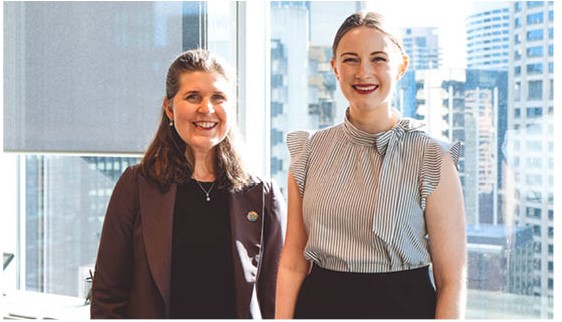“In the first quarter of this year, the number of solicitors holding NSW Practising Certificates passed 40,0000. This milestone demonstrates that the law continues to attract those who are driven to make meaningful contributions to their communities.”
As the NSW legal profession passes 40,000 working solicitors, the latest profile reveals positive momentum in gender equity.
The Law Society of NSW has today published the 2022 Annual Profile of Solicitors NSW. Among the key findings is a three per cent growth in the number of solicitors with NSW Practising Certificates since the previous year’s profile.
For the sixth consecutive year, female lawyers outnumber their male counterparts. In 2022 this was by 54 to 46 per cent – the same proportion as in 2021. In the first quarter of this year, the number of solicitors with NSW practising certificates passed 40,000.
The 2023 President of the Law Society, Cassandra Banks, says this year’s report reveals “some positive movement among private practice leadership positions since last year’s Profile that revealed persistent gaps between men and women practising law.”
The report states NSW’s private practice sector, which employs 68 per cent of the state’s solicitors, is now gender balanced, a finding consistent with the results of the 2022 National Profile of Solicitors published in May.
“While the overall private practice numbers are even, this Profile shows a pleasing, if gradual, increase in the proportion of women who hold principal or partner roles to 35 percent (up two per cent from last year). In 2013, only 24 per cent of these leadership roles in private practice were female,” Banks said.
 Cassandra Banks, 2023 President of the Law Society of NSW
Cassandra Banks, 2023 President of the Law Society of NSW
The latest Profile has shown a continuing pay gap between the genders regardless of age, years since admission or the sector in which a solicitor is employed.
Later this year, the Law Society will publish a guide to improving equitable remuneration in the legal profession. This guide has been developed with the assistance of firms who have already signed the Law Society’s Charter for the Advancement of Women.

Maddocks is one firm that has signed the Charter. Ahead of the release of this year’s profile, two women at the firm—one just beginning her career, the other a partner—discussed initiatives which have supported their progression and that of their colleagues.
“I didn’t want to be a lawyer for my entire life, I actually wanted to be an architect”, young lawyer Emily Peachey told LSJ.
“My journey into law was not quite straight forward. I did some architecture work experience in year 10 and found out that I didn’t really want a fully creatively-focused career.
“I happened to be reading To Kill a Mockingbird at the time for school [so] reading about Atticus Finch. And I thought ‘this sounds really interesting. Why don’t I look into that?’”
Peachey completed a double degree in business and law at the University of Technology Sydney, before joining Maddocks through the clerkship and subsequent graduate programs.
“What I found in my career is that I’ve been thrown right in the deep end. I’ve been given excellent opportunities to work on really interesting [matters] … to just give things a go and be championed and help develop my skills at this firm,” she said.
Currently working in the public law team, Peachey would like to eventually specialise in administrative or planning and environmental law.
“I have absolutely phenomenal senior associates … who have provided excellent guidance to me,” she says.
This well-supported path for an early-career professional in Peachey is cause for Alicia Albury, a Partner at Maddocks to reflect on the changes since her own journey into law.
Albury says the profession has transformed since she began her legal career more than 30 years ago, much of that through “deliberate and intentional” new measures.
“When I first started as a lawyer, it was back in the day when women couldn’t be heard in court unless they wore skirts or dresses,” she told LSJ.
“An awful lot has changed.
There has been a big change in the last 10 or so years. And I think that it’s come from really deliberate steps. By setting targets, by measuring performance.
Alicia Albury, Partner at Maddocks
“Between 2008 and today our female partner numbers [at Maddocks] have increased from 18 per cent to 38 per cent. In our recent promotion announcements, two of three of our partners are female and 50 per cent of our other legal staff promotions [were women]. So there has been a big change in the last 10 or so years. And I think that it’s come from really deliberate steps. By setting targets, by measuring performance. That’s how we’ve seen change happen.”
She points to flexible work initiatives—some in place before the COVID-19 pandemic made remote working a normal part of practice—enabling people to take their children to school or parents to appointments without having to take a full day off work or move to part-time arrangements, as being successful to the hiring and retention of senior women.
Albury said another of the firm’s steps to support gender equity is through setting targets to encourage more fathers to take extended paid parental leave during the first 12 months of their child’s life. This has seen a 39 per cent increase in male staff taking this time off over the past five years.
Albury now believes the next challenge and opportunity for the profession is a greater focus on intersectionality.
“I think we now need to be looking at what the experience is like for women with intersectional identities,” Albury said.
“It’s now a lot better for white middle class women. We need to be also focusing now on a lot of different dimensions of diversity that intersect with gender: ethnicity, sexual orientation, socio-economic background.”
In this year’s profile, 30 per cent of respondents to the practicing certificate survey indicated they were born overseas.
“This represents a one per cent increase from the previous year. While this is encouraging, only 0.9 per cent of solicitors identified in the survey as Aboriginal and Torres Strait Islanders,” Banks said.
More ‘pipeline’ initiatives are needed to address structural barriers to Aboriginal and Torres Strait Islanders entering the profession. The Legal Aid NSW/Macquarie University Aboriginal Legal Career Pathways program is a fine example of such an initiative.”
View the Profile here.




